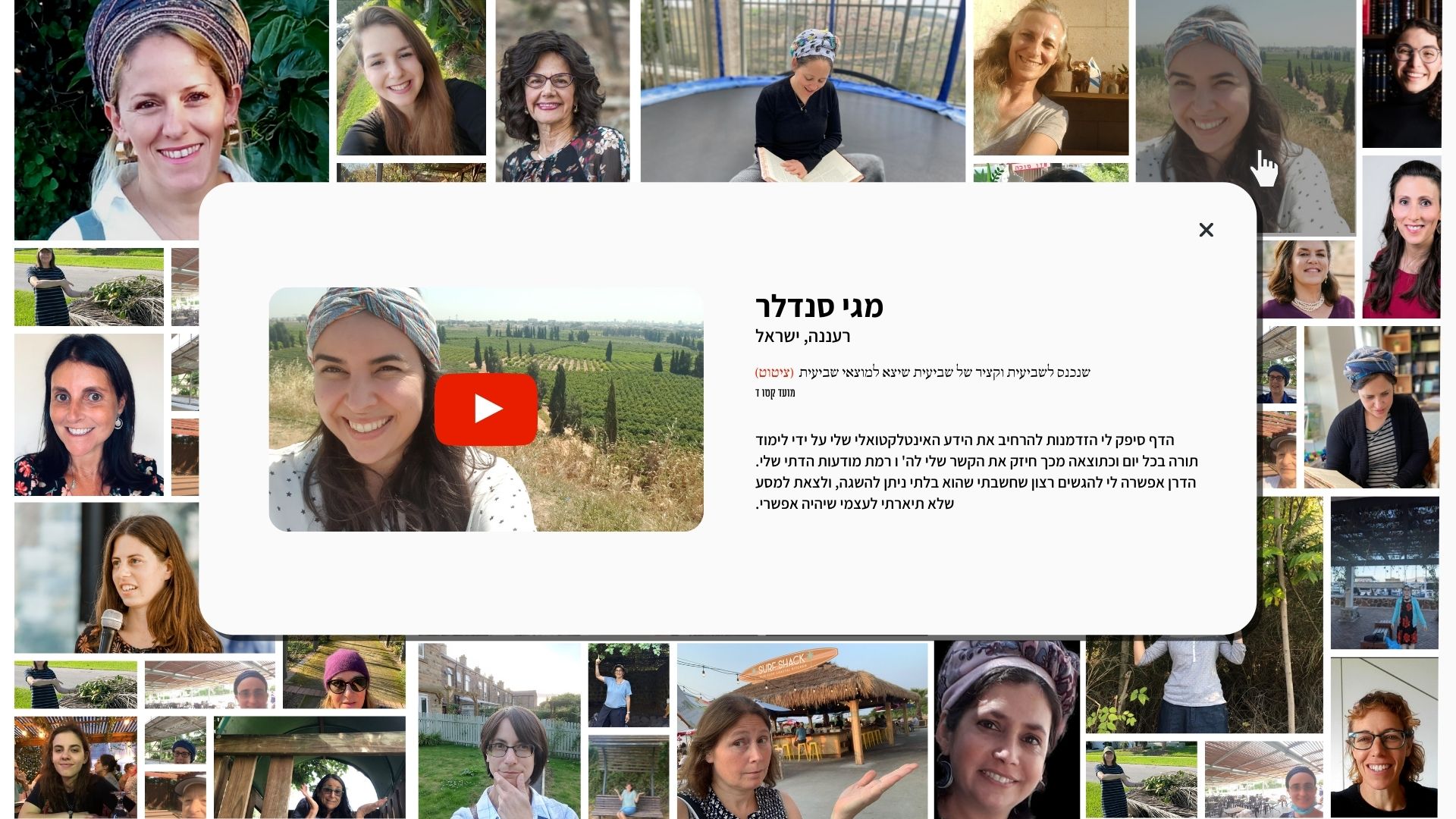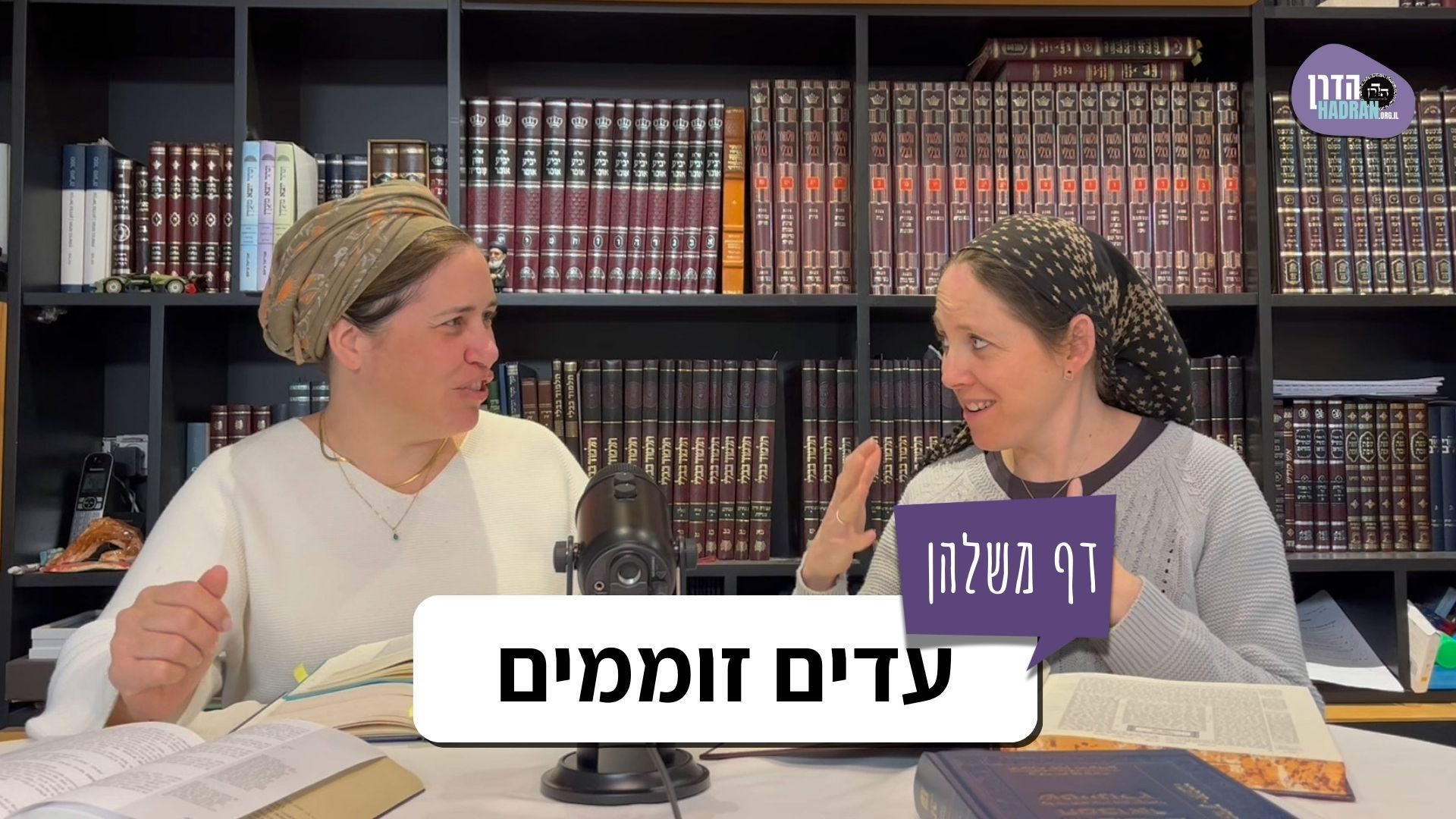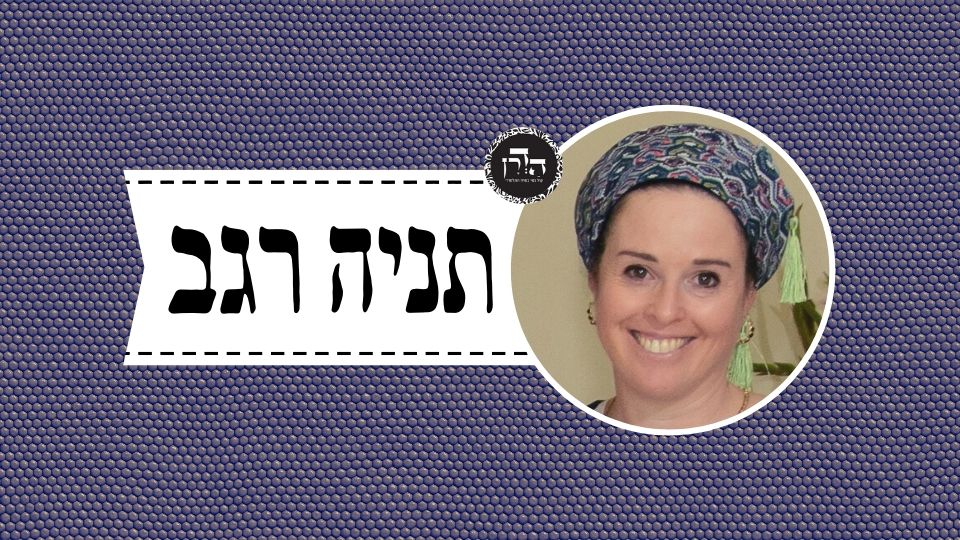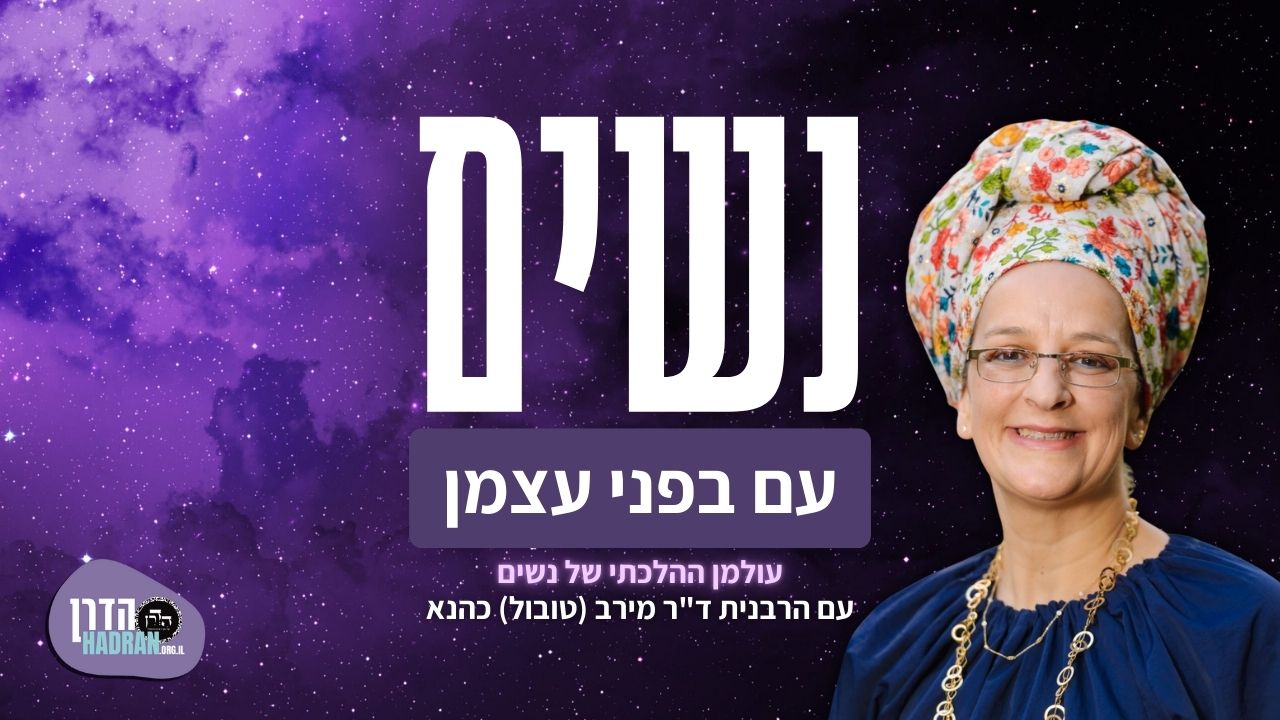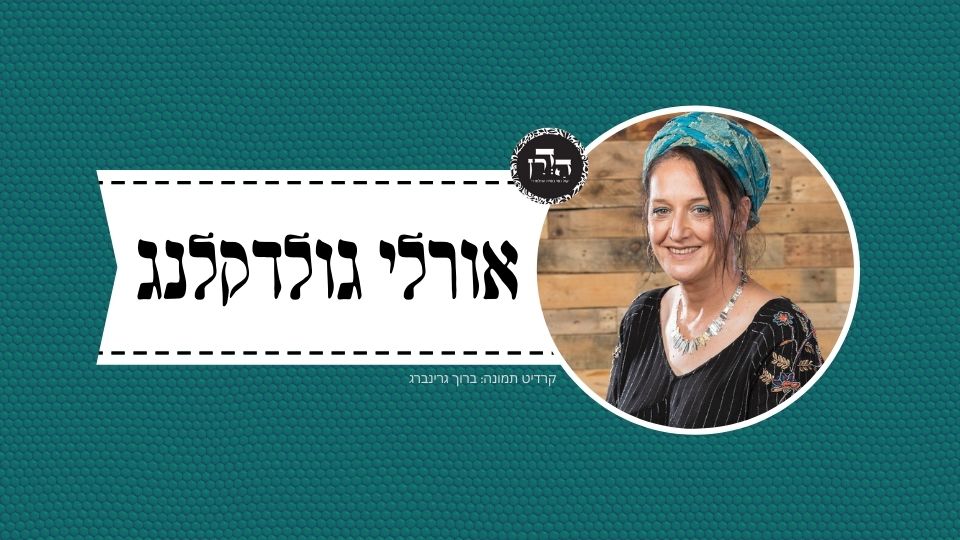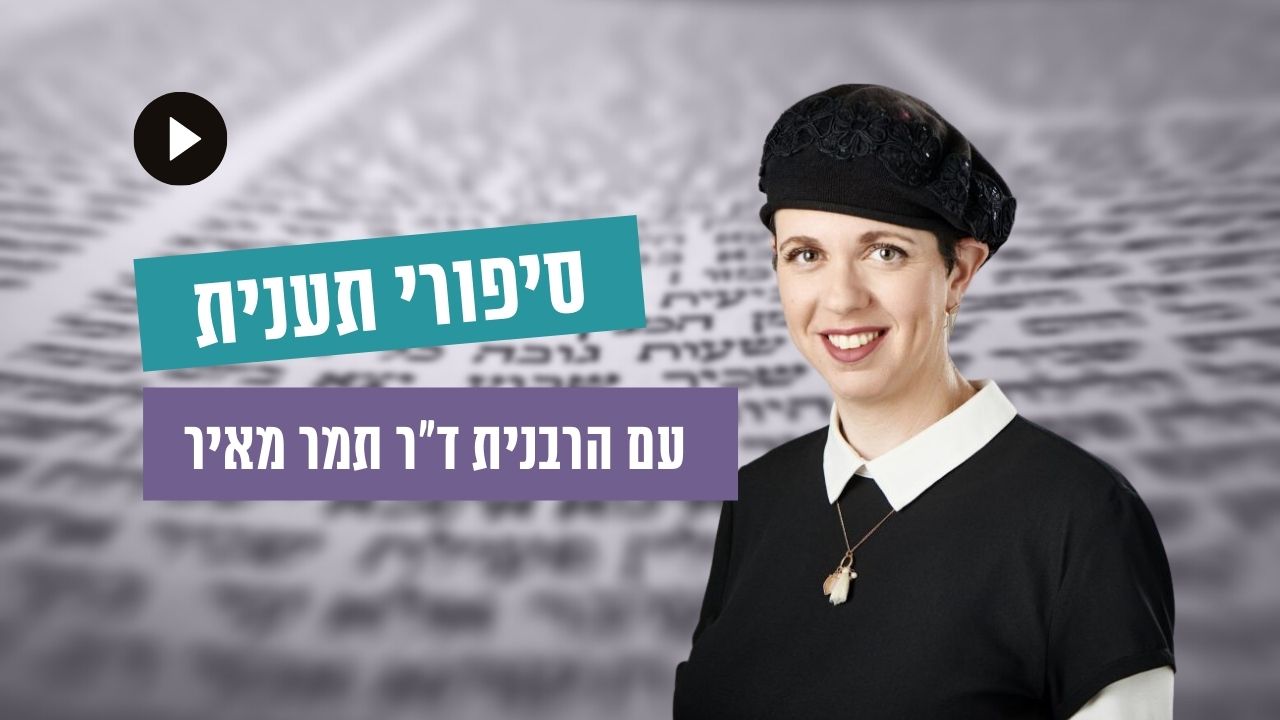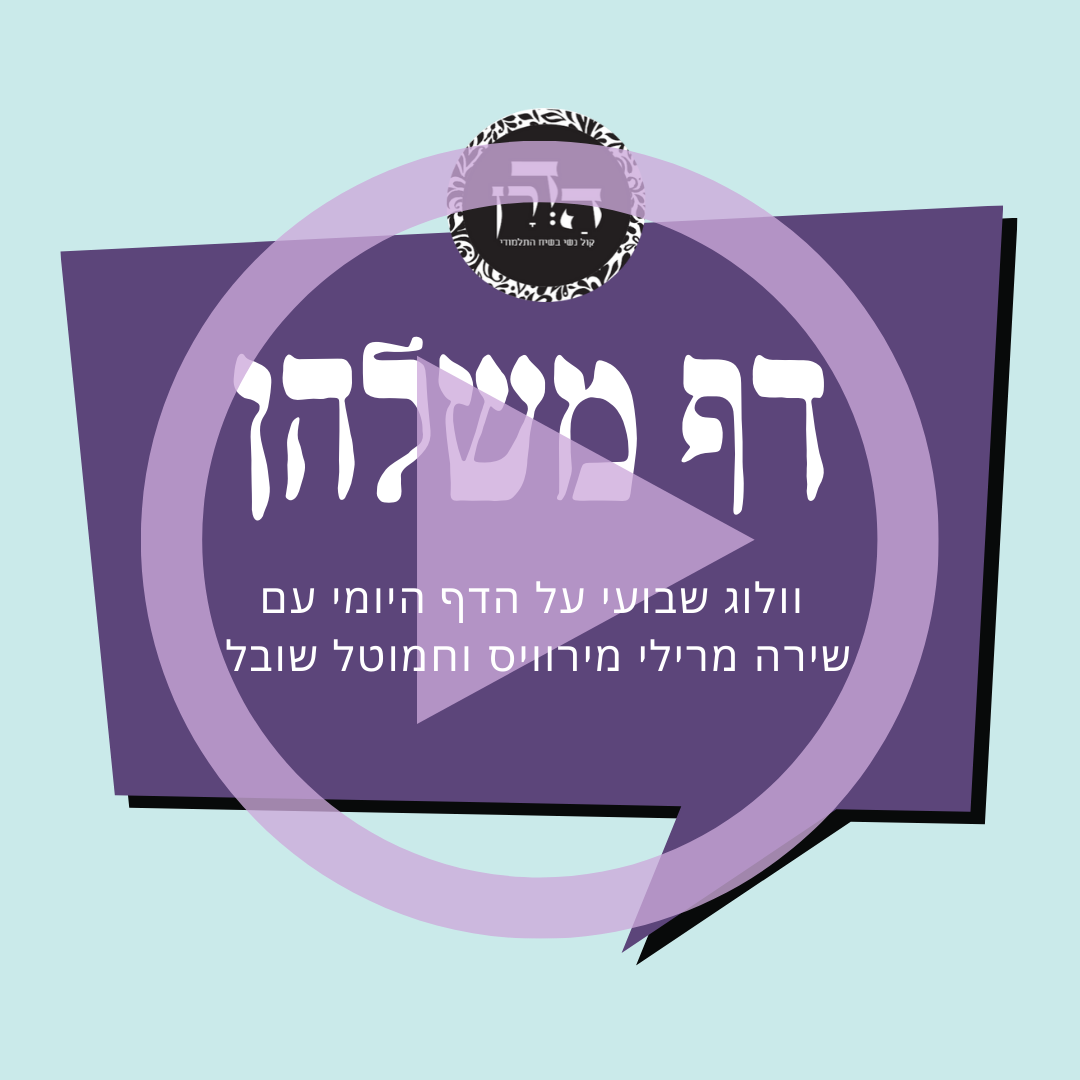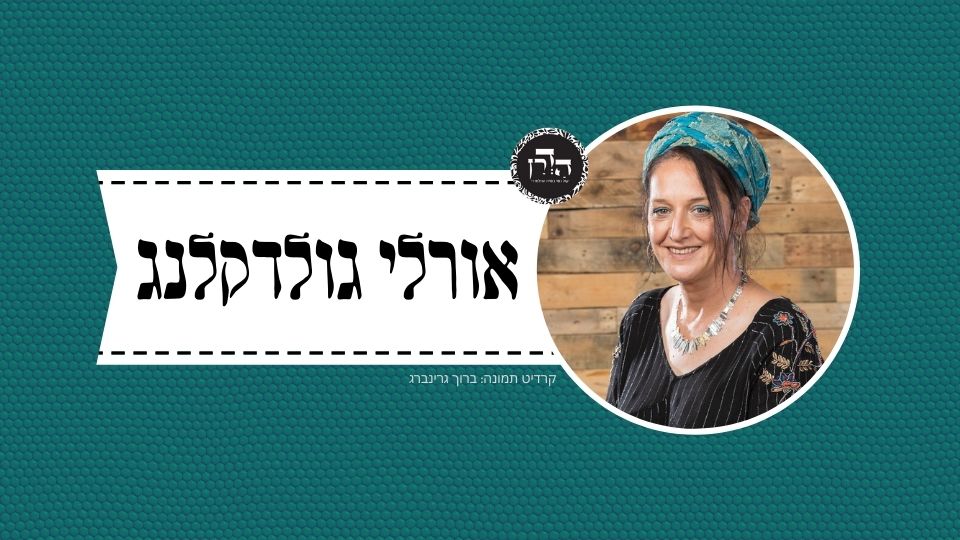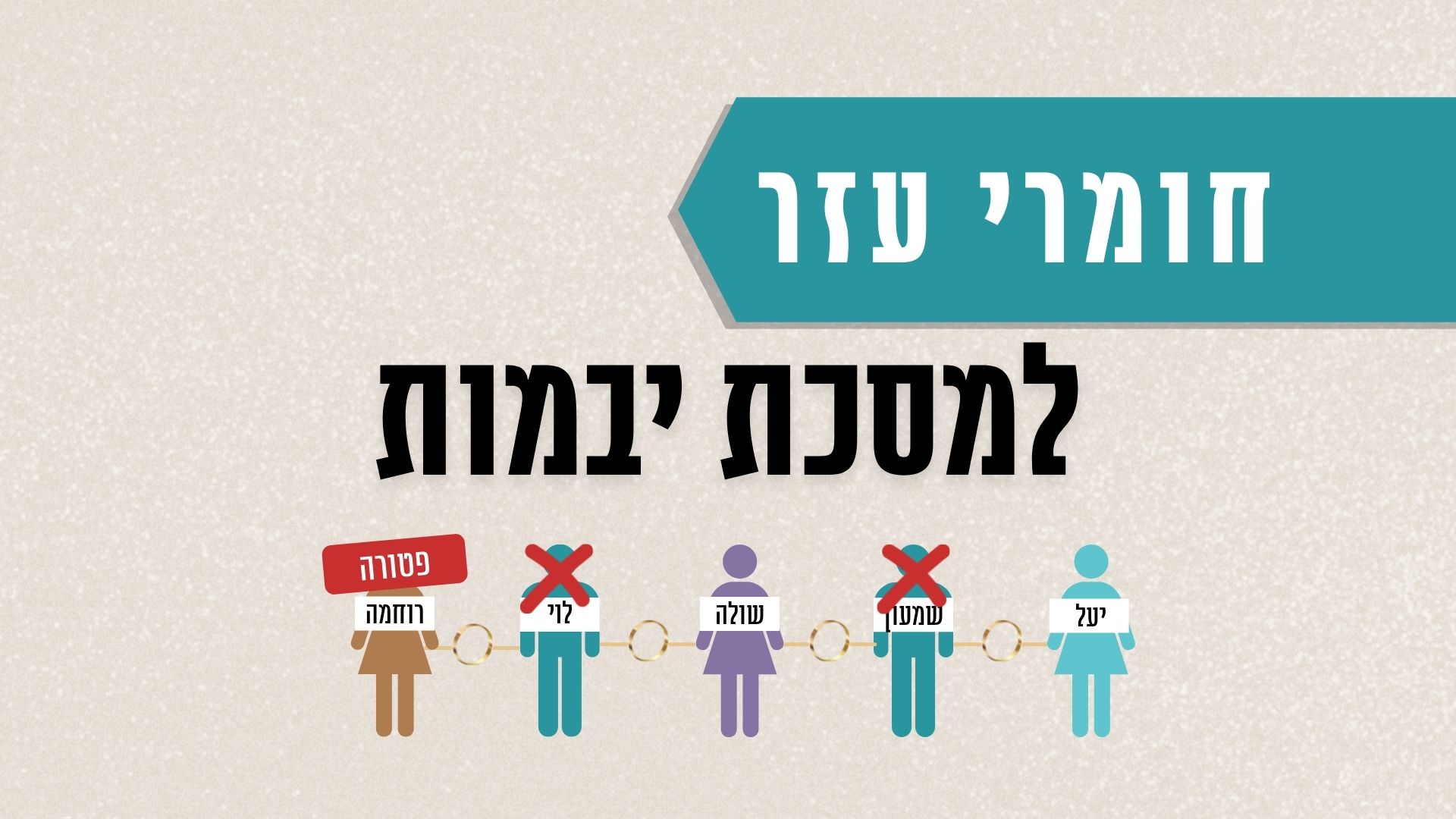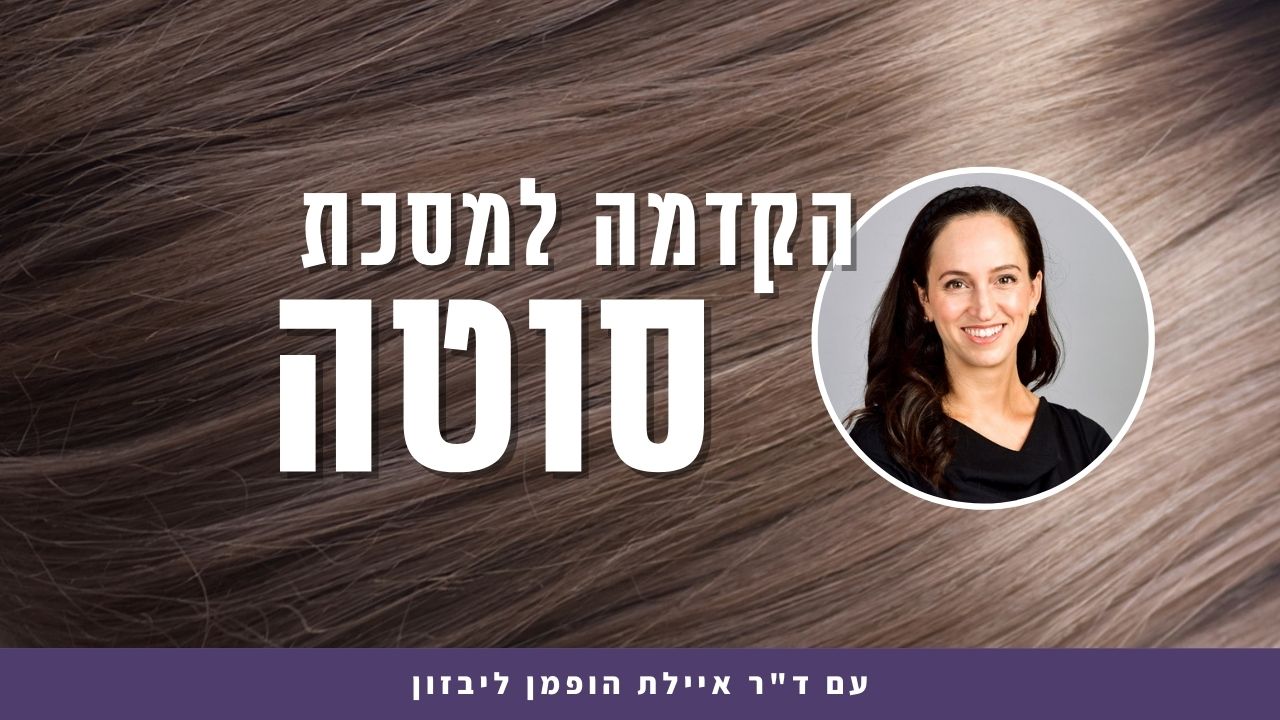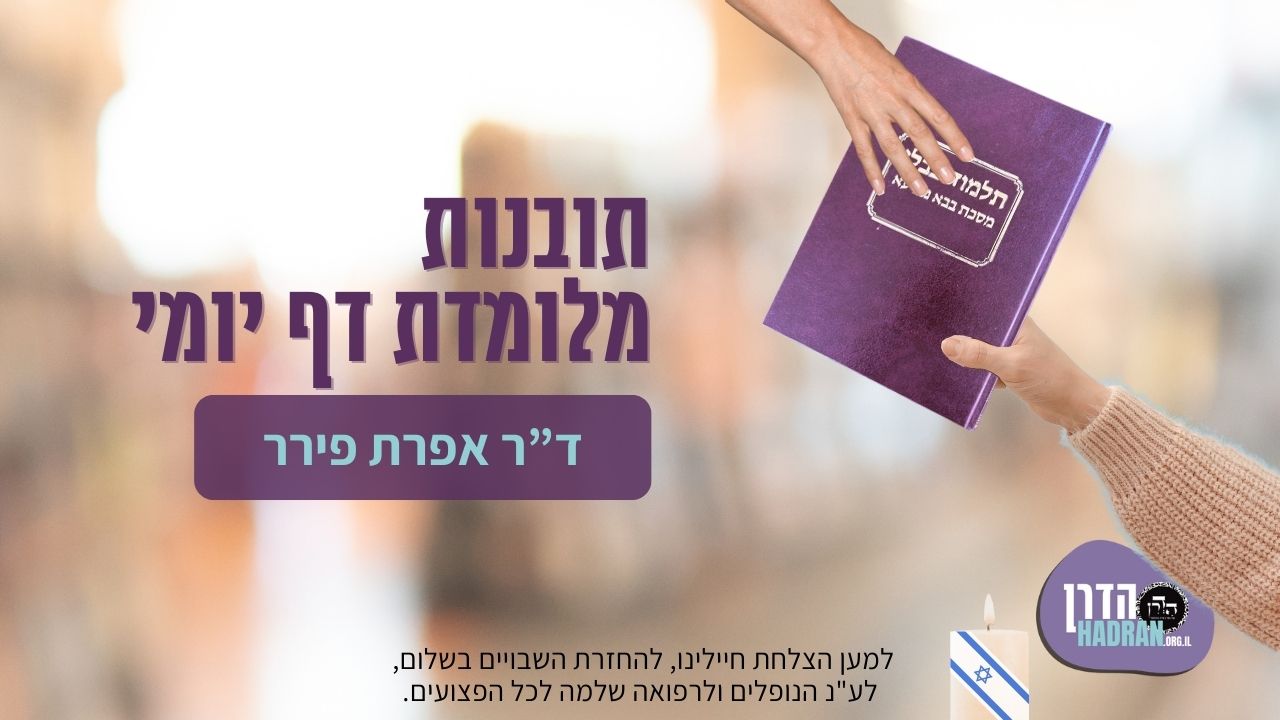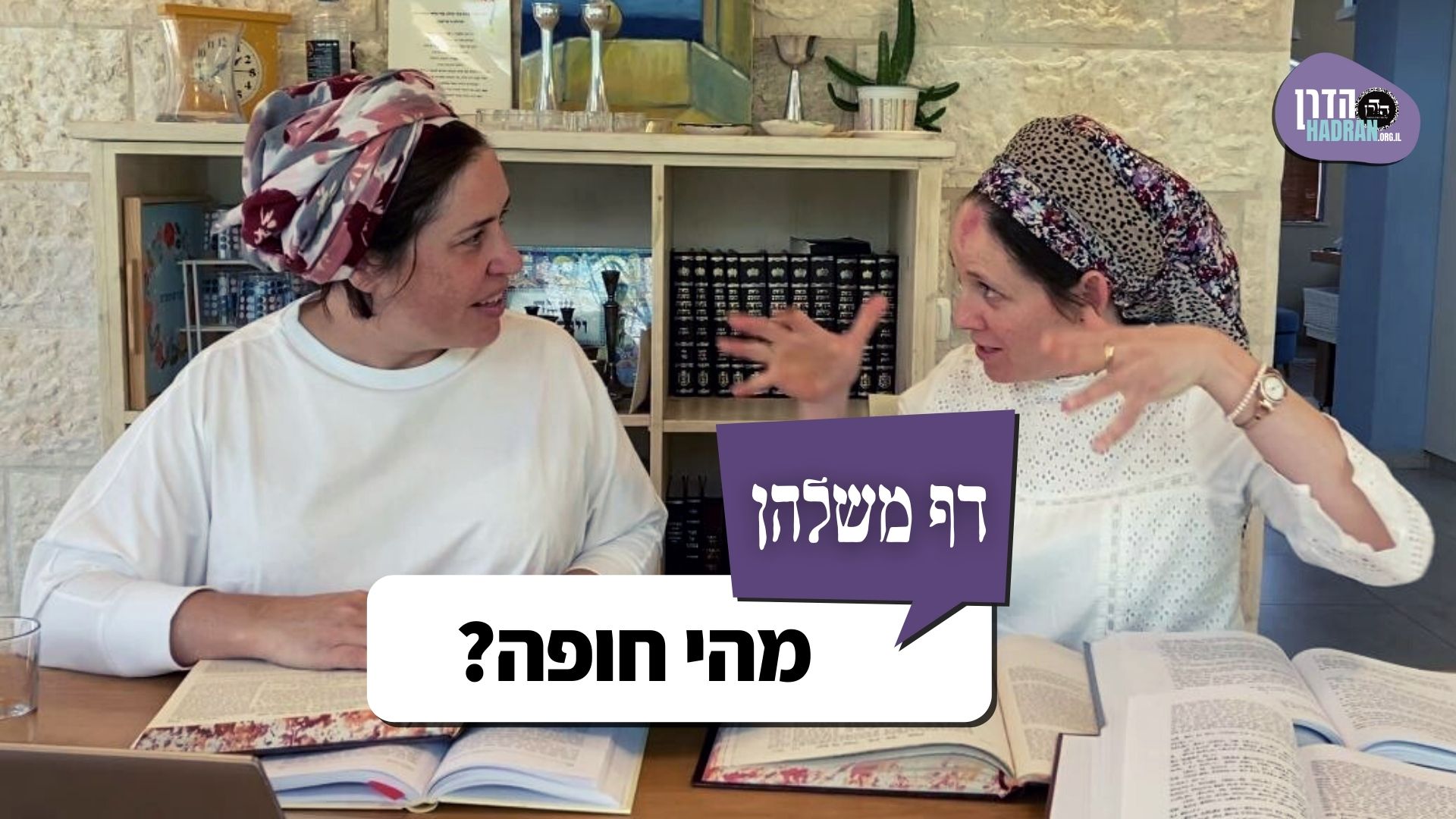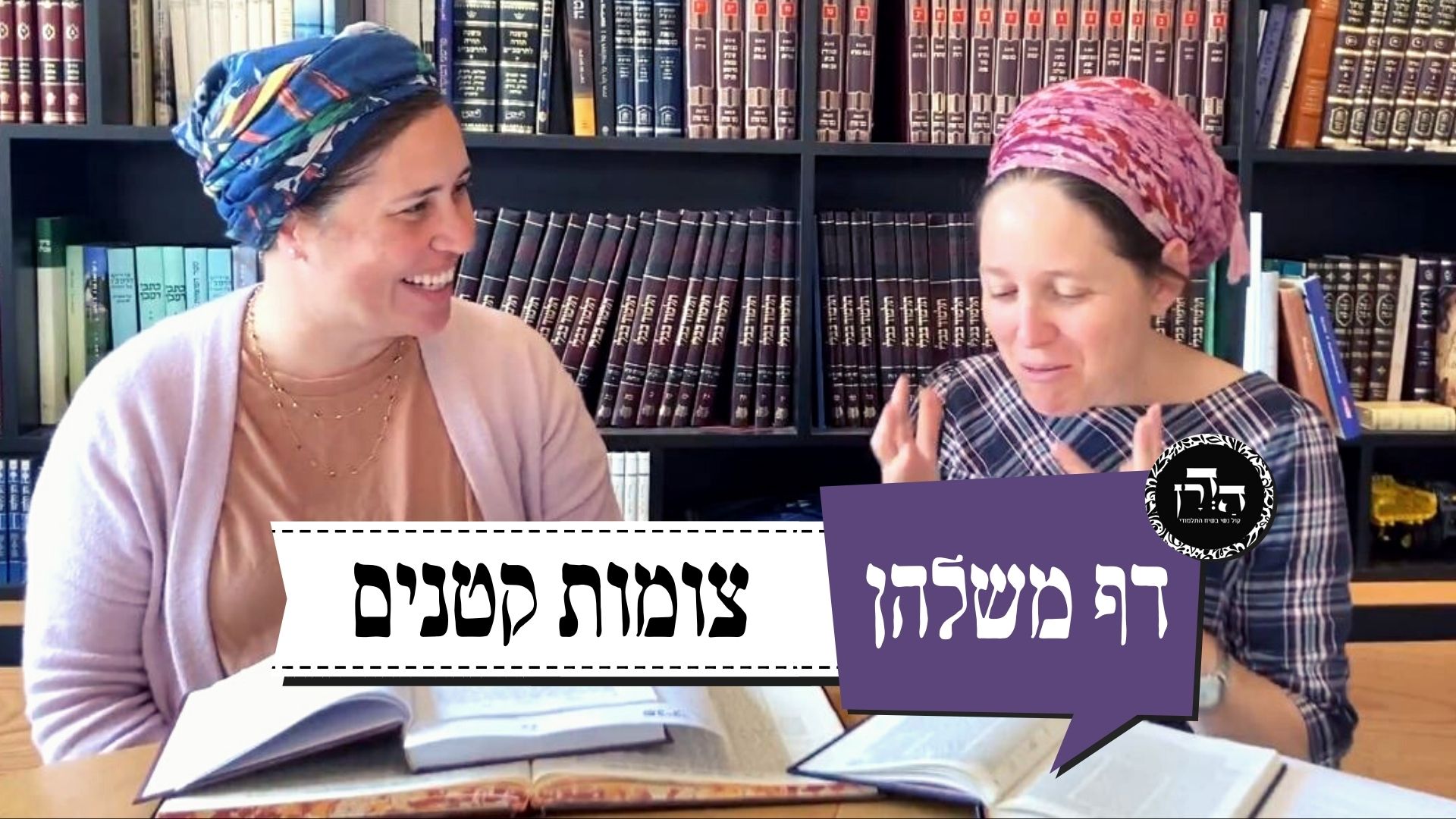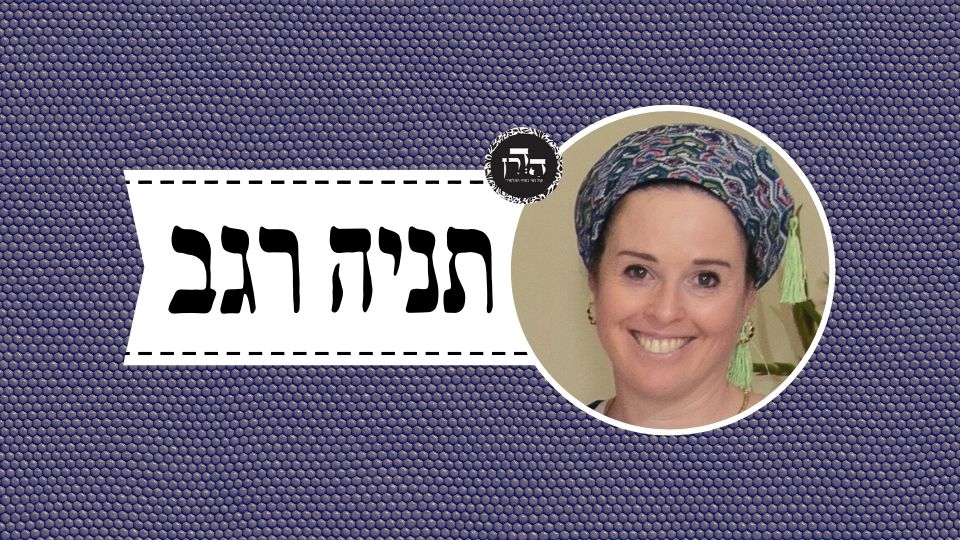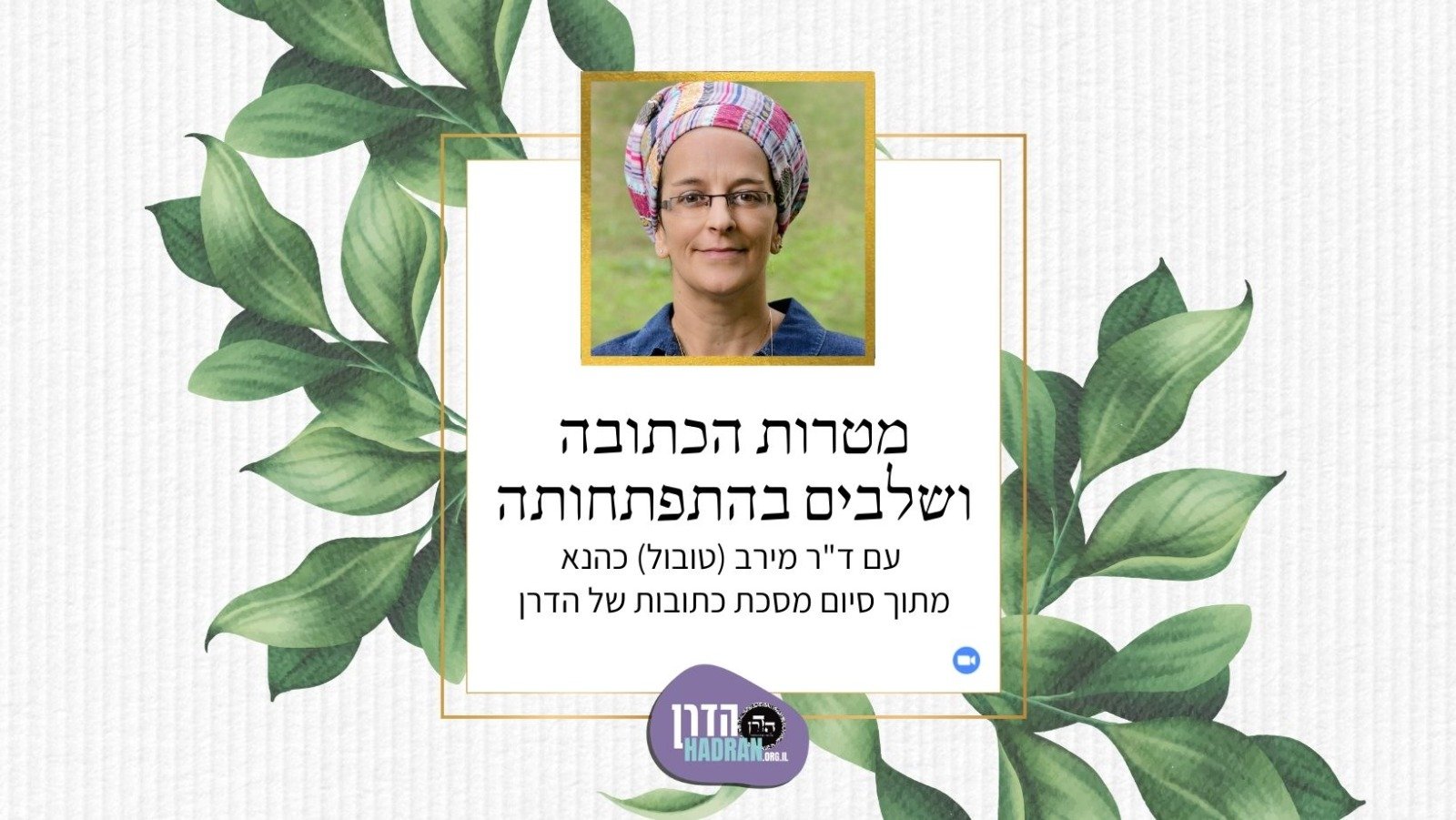עוד דינים במתנות כהונה.
הלימוד השבוע מוקדש לזכות ולשלום הַיְימׇנוֹט אֱמוּנָה בַּת באנצ’י (קָסָאוּ) בת 11 שנעלמה במקום מגוריה בצפת, לפני שנתיים, ביום ט”ז אדר תשפ”ד (25.2.24), ולא נודעו עקבותיה.
הלימוד השבוע מוקדש למען ביטחון המדינה, החיילים והאזרחים, ולמען חירותו של העם האיראני. שנזכה בקרוב שיתקיים בנו הפסוק: "לַיְּהוּדִים הָיְתָה אוֹרָה וְשִׂמְחָה וְשָׂשֹׂן וִיקָר”.
הלימוד השבוע מוקדש לזכות וְלִשְׁלוֹם הָיימָנוֹט אֱמוּנָה בַּת באנצ’י (קָסָאוּ), בת 11 שנעלמה במקום מגוריה בצפת, לפני שנתיים, ביום ט”ז אדר תשפ״ד (25.2.24), ולא נודעו עקבותיה. אנו מתפללים שֶׁתִּמָּצֵא וְתוּשַׁב לביתה במהרה!
רוצה להקדיש שיעור?
כלים
הלימוד השבוע מוקדש לזכות ולשלום הַיְימׇנוֹט אֱמוּנָה בַּת באנצ’י (קָסָאוּ) בת 11 שנעלמה במקום מגוריה בצפת, לפני שנתיים, ביום ט”ז אדר תשפ”ד (25.2.24), ולא נודעו עקבותיה.
הלימוד השבוע מוקדש למען ביטחון המדינה, החיילים והאזרחים, ולמען חירותו של העם האיראני. שנזכה בקרוב שיתקיים בנו הפסוק: "לַיְּהוּדִים הָיְתָה אוֹרָה וְשִׂמְחָה וְשָׂשֹׂן וִיקָר”.
הלימוד השבוע מוקדש לזכות וְלִשְׁלוֹם הָיימָנוֹט אֱמוּנָה בַּת באנצ’י (קָסָאוּ), בת 11 שנעלמה במקום מגוריה בצפת, לפני שנתיים, ביום ט”ז אדר תשפ״ד (25.2.24), ולא נודעו עקבותיה. אנו מתפללים שֶׁתִּמָּצֵא וְתוּשַׁב לביתה במהרה!
כלים
העמקה
רוצה להבין מה באמת קורה מתחת לפני השטח של הסוגיה?
שיעורים, פודקאסטים והרחבות של מיטב המורות שלנו יפתחו לך עוד זוויות וכיווני חשיבה.
חדשה בלימוד הגמרא?
זה הדף הראשון שלך? איזו התרגשות עצומה! יש לנו בדיוק את התכנים והכלים שיעזרו לך לעשות את הצעדים הראשונים ללמידה בקצב וברמה שלך, כך תוכלי להרגיש בנוח גם בתוך הסוגיות המורכבות ומאתגרות.
פסיפס הלומדות שלנו
גלי את קהילת הלומדות שלנו, מגוון נשים, רקעים וסיפורים. כולן חלק מתנועה ומסע מרגש ועוצמתי.
חולין קלב
מטונך אהרן ובניו כתובין בפרשה
from your burden [mitunakh], i.e., from that which you raise your objection, I can cite a proof for my practice: With regard to the meal offering of a priest, both Aaron and his sons are written in the passage discussing this offering: “And this is the law of the meal offering: The sons of Aaron shall offer it before the Lord, in front of the altar” (Leviticus 6:7). The verse emphasizes that these halakhot apply only to male priests and not to their daughters. This indicates that when the verse refers merely to priests, even their daughters are included. Accordingly, one may give gifts of the priesthood to the daughter of a priest.
דבי רבי ישמעאל תנא כהן ולא כהנת וילמוד סתום מן המפורש
The Gemara cites the opinions of various tanna’im with regard to the practice of Ulla: The school of Rabbi Yishmael taught: Anywhere that the Torah mentions a priest with regard to gifts of the priesthood, it is referring specifically to a priest and not a female priest, and let one derive the meaning of an unspecified reference to a priest from the explicit verse that states with regard to meal offerings: “Aaron and his sons.” This verse indicates that any reference to a priest excludes a priest’s daughter.
דבי ר’ אליעזר בן יעקב תנא כהן ואפילו כהנת הוי מיעוט אחר מיעוט ואין מיעוט אחר מיעוט אלא לרבות
The school of Rabbi Eliezer ben Yaakov taught: In general, the reference to a priest in a verse serves to exclude a priest’s daughter. But when the verse mentions a priest with regard to gifts of the priesthood, it means to include even a female priest. This is because the verse mentions priests twice: “And this shall be the priests’ due from the people, from them that perform a slaughter, whether it be ox or sheep, that they shall give to the priest the foreleg, and the jaw, and the maw” (Deuteronomy 18:3). Since each reference to a priest excludes the daughter of a priest, this verse is a case of a restrictive expression following a restrictive expression, and there is a hermeneutical principle that a restrictive expression following a restrictive expression serves only to amplify the halakha and include additional cases, in this instance, the daughter of a priest.
רב כהנא אכל בשביל אשתו רב פפא אכל בשביל אשתו רב יימר אכל בשביל אשתו רב אידי בר אבין אכל בשביל אשתו
The Gemara relates that Rav Kahana, who was an Israelite, partook of gifts of the priesthood on account of his wife, who was the daughter of a priest. Similarly, Rav Pappa partook of gifts of the priesthood on account of his wife, Rav Yeimar partook of gifts on account of his wife, and Rav Idi bar Avin partook of them on account of his wife.
אמר רבינא אמר לי מרימר הלכתא כוותיה דרב והלכתא כוותיה דרב חסדא והלכתא כוותיה דעולא
Ravina said: Mareimar said to me that the halakha is in accordance with the opinion of Rav that it is uncertain whether or not Levites are obligated to give the gifts of the priesthood, and consequently, gifts are not removed from their possession to be given to the priests. And the halakha is in accordance with the opinion of Rav Ḥisda that one who damages or consumes gifts of the priesthood is exempt from payment. And the halakha is in accordance with the opinion of Ulla that gifts of the priesthood may be given to the daughter of a priest.
והלכתא כוותיה דרב אדא בר אהבה לויה שילדה בנה פטור מחמש סלעים
And in a case not previously discussed but related to the opinion of Ulla, the halakha is in accordance with the opinion of Rav Adda bar Ahava with regard to a female Levite, i.e., the daughter of a Levite, who gave birth to a firstborn boy, even if she is married to an Israelite, that her son is exempt from the obligation to give five sela to the priest for his redemption, as the child is considered the son of a Levite, and Levites are exempt from this obligation.
תנו רבנן הזרוע והלחיים והקבה נוהגים בכלאים ובכוי רבי אליעזר אומר כלאים הבא מן העז ומן הרחל חייב במתנות (מן התייש ומן הצבייה) פטור מן המתנות
§ The Gemara cites a dispute with regard to the gifts of the foreleg, the jaw, and the maw. The Sages taught in a baraita: The obligation to give the foreleg, the jaw, and the maw applies even to a hybrid animal and to the animal known as a koy. Rabbi Eliezer says: A hybrid that results from the mating of a goat and a ewe is obligated to have gifts of the priesthood given from it, while a hybrid that results from the mating of a goat and a doe is exempt from having gifts of the priesthood given from it. This is because the verse states with regard to gifts of the priesthood: “Whether it be an ox or sheep” (Deuteronomy 18:3), i.e., a domesticated animal, and a doe is not a domesticated animal.
מכדי קי”ל דלענין כסוי הדם ומתנות לא משכחת ליה אלא בצבי הבא על התיישה ובין לרבי אליעזר בין לרבנן מספקא להו אי חוששין לזרע האב אי אין חוששין
The Gemara asks: Now, we maintain (see 79b–80a) with regard to the mitzvot of covering the blood and giving the gifts of the priesthood that you do not find that Rabbi Eliezer and the Rabbis disagree except in the case of an animal born from a deer that mates with a female goat. And both Rabbi Eliezer and the Rabbis are uncertain whether one needs to be concerned with its paternity when determining the species of a hybrid animal, which would mean that this animal is part domesticated and part undomesticated, or whether one does not need to be concerned with paternity and the species of an animal is determined entirely by the species of its mother, in which case it is a domesticated animal.
ובשה ואפילו מקצת שה קמיפלגי מר סבר שה ואפי’ מקצת שה ומר סבר שה ואפילו מקצת שה לא אמרינן
And they disagree with regard to whether the obligation of the gifts applies to a sheep and even an animal that is partially a sheep, i.e., partially domesticated. One Sage, the Rabbis, holds that the obligation applies to a sheep and even an animal that is partially a sheep; and one Sage, Rabbi Eliezer, holds that we do not say that the obligation applies to a sheep and even an animal that is partially a sheep.
בשלמא ר’ אליעזר דפטר קסבר שה ולא מקצת שה אלא לרבנן נהי נמי דקסברי שה ואפילו מקצת שה פלגא לשקול ואידך פלגא לימא ליה אייתי ראיה דאין חוששין לזרע האב ושקול אמר רב הונא בר חייא מאי חייב נמי דקא אמר חייב בחצי מתנות
The Gemara concludes its question: Granted, it is understandable that Rabbi Eliezer deems the owner of a hybrid exempt from the mitzva to give the priestly gifts, as he holds that only in the case of a sheep is one obligated to give gifts of the priesthood, but not with regard to animals that are only partially sheep. But according to the opinion of the Rabbis, though indeed they hold that sheep and even animals that are partially sheep are subject to the obligation of giving gifts of the priesthood, let the priest take only half of the gifts. And with regard to the other half, let the owner of the animal say to him: Bring proof that one need not be concerned with its paternity and then you may take the other half. Rav Huna bar Ḥiyya said in response: What do the Rabbis mean when they say that the owner of this animal is obligated? They mean that he is obligated in half of the gifts.
מתיב רבי זירא כוי יש בו דרכים שוין לבהמה ויש בו דרכים שוין לחיה ויש בו דרכים שוין לחיה ולבהמה
Rabbi Zeira raises an objection to this response from a baraita: In the case of a koy, with regard to which it is uncertain whether it is a domesticated animal or an undomesticated one, there are ways in which its halakhot correspond to those of a domesticated animal, and there are ways in which its halakhot correspond to those of an undomesticated animal. And there are ways in which its halakhot correspond to those of both an undomesticated animal and a domesticated animal.
כיצד חלבו אסור כחלב בהמה ודמו חייב לכסות כדם החיה דרכים שוין לבהמה ולחיה שדמו וגידו אסורין כבהמה וחיה וחייב בזרוע ולחיים והקבה ורבי אליעזר פוטר
The baraita elaborates: How so? Its fat is forbidden like the forbidden fat of a domesticated animal, unlike that of an undomesticated one. And one is obligated to cover its blood from slaughter with dirt, like the blood of an undomesticated animal. And there are ways in which its halakhot correspond to both those of a domesticated animal and an undomesticated animal, as its blood and its sciatic nerve are forbidden like those of a domesticated animal and an undomesticated animal. And its owner is obligated to give the foreleg, the jaw, and the maw from it to the priest, as in the case of domesticated animals. And Rabbi Eliezer deems the owner of a koy exempt from the mitzva to give the gifts.
ואם איתא חייב בחצי מתנות מבעי ליה איידי דתנא חלבו ודמו דלא מתני חצי חצי משום הכי לא קא תני חצי
Rabbi Zeira asks: And if it is so that the Rabbis mean that the owner of a koy is obligated to give half of the gifts, then the baraita should have said that he is obligated to give half of the gifts from it. The Gemara responds: Since the tanna taught that its fat and its blood are forbidden, with regard to which it could not teach that half of its blood or half of its fat are forbidden, as it is impossible that half of it is forbidden while the other half is permitted, due to that reason the tanna did not teach that the owner of a koy is obligated in half of the gifts.
כי אתא רבין אמר רבי יוחנן כוי לרבנן חייב בכולהו מתנות דתניא שור מה ת”ל (דברים יח, ג) אם שור לרבות את הכלאים שה מה ת”ל (דברים יח, ג) אם שה לרבות את הכוי
The Gemara relates that when Ravin came from Eretz Yisrael to Babylonia, he said that Rabbi Yoḥanan said: According to the Rabbis, a koy is obligated to have all of the gifts of the priesthood given from it. As it is taught in a baraita: The verse states with regard to the gifts of the priesthood: “Whether it be an ox or sheep” (Deuteronomy 18:3). Since the verse needed to state only “ox,” why must the verse state: “Whether it be an ox”? This phrase serves to include a hybrid in the obligation to give the gifts of the priesthood. And since the verse needed to state only “sheep,” why must the verse state: “Or sheep”? This phrase serves to include the koy in the obligation to give the gifts.
ורבי אליעזר האי אם למה לי מיבעי ליה לחלק ורבנן לחלק מנא להו נפקא להו (דברים יח, ג) מאת זובחי הזבח
The Gemara asks: And according to the opinion of Rabbi Eliezer, who deems the owners of a koy and the offspring of a hybrid exempt from giving gifts of the priesthood from these animals, why do I need this phrase: “Whether it be an ox or sheep”? The Gemara responds: He requires it to divide between an ox and a sheep, indicating that one is obligated with regard to either animal alone. Were it not for this phrase, one might have concluded that he is obligated to give the gifts only after slaughtering both an ox and a sheep. The Gemara asks: And the Rabbis, who derive other halakhot from this phrase, from where do they derive to divide between an ox and a sheep? The Gemara responds: They derive it from the phrase: “From them that perform a slaughter” (Deuteronomy 18:3), which indicates that the obligation to give the gifts applies even to one animal.
ור’ אליעזר האי מאת זובחי הזבח מאי עביד ליה מבעי ליה לכדרבא דאמר רבא הדין עם הטבח:
The Gemara asks: And Rabbi Eliezer, what does he do with this phrase: “From them that perform a slaughter,” i.e., what does he derive from it? The Gemara responds: He requires it for a statement of Rava, as Rava said: If a priest seeks to claim gifts of the priesthood in court, the priest issues his demand with the butcher, even if the animal itself belongs to another individual.
מתני׳ בכור שנתערב במאה בזמן שמאה שוחטין את כולן פוטרים את כולן אחד שוחט את כולן פוטרים לו אחד
MISHNA: With regard to a blemished firstborn animal, which one may slaughter and eat without being required to give the foreleg, jaw, and maw to the priest, that was intermingled with one hundred non-sacred animals, from which one is required to give those gifts, in a case when one hundred different people slaughter all of them, each slaughtering one animal, one exempts them all from giving the gifts, as each could claim that the animal that he slaughtered was the firstborn. If one person slaughtered them all, one exempts one of the animals for him.
השוחט לכהן ולעובד כוכבים פטור מן המתנות והמשתתף עמהן צריך שירשום ואם אמר חוץ מן המתנות פטור מן המתנות
One who slaughters the animal of a priest for the priest or the animal of a gentile for the gentile is exempt from the obligation to give the gifts of the foreleg, the jaw, and the maw. And an Israelite who enters into partnership with a priest or a gentile must mark the animal to indicate that it is jointly owned and exempt from the obligation to give the gifts. And if a priest sold his animal to an Israelite and said: The animal is sold except for the gifts with it, the Israelite is exempt from the obligation to give the gifts, as they are not his.
אמר מכור לי בני מעיה של פרה והיו בהן מתנות נותנן לכהן ואינו מנכה לו מן הדמים לקחן הימנו במשקל נותנן לכהן ומנכה לו מן הדמים:
If the Israelite said to the one slaughtering the animal: Sell me the innards of a cow, and there were gifts included with it, i.e., the maw, the purchaser gives them to the priest and he does not deduct the value of the gifts from the money that he pays him. If he bought the innards from the slaughterer by weight, the purchaser gives the gifts, i.e., the maw, to the priest and deducts the value of the gifts from the money that he pays him.
גמ׳ ואמאי יבא עליו כהן משני צדדין ולימא ליה אי בכור הוא כוליה דידי הוא ואי לאו בכור הוא הב לי מתנתאי
GEMARA: The mishna teaches that if a firstborn animal was intermingled with one hundred non-sacred animals, each belonging to a different person, all of the animals are excluded from the obligation to give the gifts, due to the uncertainty of which animal is the firstborn. The Gemara asks: But why is this the halakha? Let the priest come upon each slaughterer with a claim from two sides, i.e., let the priest say to him: If this animal is a firstborn, it is completely mine; and if it is not a firstborn but is instead a non-sacred animal, then give me my gifts.
אמר רב אושעיא בבא לידי כהן ומכרו לישראל במומו:
Rav Oshaya says in response: In general, a priest may issue such a claim. But the mishna is dealing with a case where the firstborn came into the possession of the priest when it was unblemished and thereafter it developed a permanent blemish, and the priest sold it to an Israelite in its blemished state. In such a case, the priest may not demand that the owner give him the entire animal with the claim that it is a firstborn, as he already received it once as a firstborn.
השוחט לכהן ולעובד כוכבים פטור מן המתנות: וליתני כהן ועובד כוכבים פטורין מן המתנות אמר רבא זאת אומרת הדין עם הטבח
§ The mishna teaches that one who slaughters the animal of a priest for the priest or the animal of a gentile for the gentile is exempt from the obligation to give the gifts of the foreleg, the jaw, and the maw. The Gemara suggests: And let the tanna simply teach that a priest and a gentile are exempt from the obligation to give the gifts. Rava says in explanation: That is to say, i.e., the wording of the mishna indicates, that the demand of a priest who seeks to claim gifts of the priesthood is with the butcher, not with the owner of the animal. Even if the butcher is himself a priest, if he slaughters an animal on behalf of an Israelite he is obligated to give the gifts.
דרש רבא (דברים יח, ג) מאת העם ולא מאת הכהנים כשהוא אומר (דברים יח, ג) מאת זובחי הזבח הוי אומר אפילו טבח כהן במשמע
The Gemara adds: Rava also interpreted the verse in such a manner. The verse states: “This shall be the priests’ due from the people, from them that perform a slaughter, whether it be ox or sheep, that they shall give to the priest the foreleg, and the jaw, and the maw” (Deuteronomy 18:3). The verse specifies that the gifts are taken “from the people,” and not from the priests. When the verse states: “From them that perform a slaughter,” indicating that the gifts are given by anyone who slaughters an animal, you must say that this teaches that even a butcher who is a priest is included in the obligation to give the gifts.
אושפיזיכניה דר’ טבלא כהן הוה והוה דחיק ליה מלתא אתא לקמיה דרבי טבלא אמר ליה זיל אישתתף בהדי טבחי ישראל דמגו דמפטרי ממתנתא משתתפי בהדך
§ The mishna teaches that the obligation to give the gifts of the priesthood does not apply to an animal jointly owned by an Israelite and a priest. The Gemara relates that the host [ushpizikhnei] of Rabbi Tavla was a priest and he was hard-pressed for money. He came before Rabbi Tavla to ask for advice. Rabbi Tavla said to him: Go and enter into a partnership with those Israelite butchers, to obtain part ownership of their animals, as since they will be exempt from the obligation to give the gifts on account of this partnership, they will agree to enter into a business partnership with you free of charge.
חייביה רב נחמן אמר ליה והא רבי טבלא פטרן אמר ליה זיל אפיק ואי לא מפקינא לך ר’ טבלא מאונך
The priest heeded the advice of Rabbi Tavla and entered into a partnership with an Israelite butcher. Nevertheless, Rav Naḥman obligated the butcher to give the gifts of the priesthood from the animals he slaughtered. The priest said to Rav Naḥman: But Rabbi Tavla exempted us from this obligation. Rav Naḥman said to him: Go remove the gifts of the priesthood that are in your possession and give them to a priest, and if you will not do so, I will remove Rabbi Tavla from your ear [me’unakh], i.e., I will refute his basis for deeming you exempt.
אזל ר’ טבלא קמיה דרב נחמן א”ל מ”ט עביד מר הכי א”ל דכי אתא ר’ אחא בר חנינא מדרומא אמר ר’ יהושע בן לוי זקני דרום אמרו כהן טבח שתים ושלש שבתות פטור מן המתנות מכאן ואילך חייב במתנות
Rabbi Tavla came before Rav Naḥman and said to him: What is the reason that the Master has done this and ruled in contradiction to the mishna? Rav Naḥman said to him: I ruled in this manner, as when Rabbi Aḥa bar Ḥanina of the south came from Eretz Yisrael to Babylonia, he said that Rabbi Yehoshua ben Levi and all the elders of the south said: With regard to a priest who becomes a butcher, for the first two or three weeks he is exempt from the obligation to give the gifts, as he has not yet established himself in the community as a butcher. But from this point forward he is obligated to give the gifts, as he is now known as a butcher.
אמר ליה ולעביד ליה מר מיהת כר’ אחא בר חנינא א”ל הני מילי דלא קבע מסחתא אבל הכא הא קבע מסחתא
Rabbi Tavla said to Rav Naḥman: And let the Master at least do for the priest in accordance with the opinion of Rabbi Aḥa bar Ḥanina and exempt him from giving the gifts for the first three weeks of his partnership. Rav Naḥman said to him: This statement of Rabbi Aḥa bar Ḥanina applies only when the priest did not immediately establish a butcher shop. In such a case, the priest is exempt until he becomes known as a recognized butcher. But here, he has already established a butcher shop and is therefore obligated to give the gifts without delay.
אמר רב חסדא האי כהנא דלא מפריש מתנתא ליהוי בשמתא דאלהי ישראל אמר רבה בר רב שילא הני טבחי דהוצל קיימי בשמתא דרב חסדא הא עשרים ותרתין שנין
§ Rav Ḥisda said: With regard to a priest who slaughters an animal and does not separate gifts of the priesthood from them for another priest, let him be under the excommunication of the God of Israel. Rabba bar Rav Sheila said: These butchers of the city of Huzal have remained under the excommunication of Rav Ḥisda these last twenty-two years, as they have continuously refused to separate gifts of the priesthood for this period.
למאי הלכתא אילימא דתו לא משמתינן להו והא תניא במה דברים אמורים במצות לא תעשה אבל במצות עשה כגון אומרים לו עשה סוכה ואינו עושה לולב ואינו עושה עשה ציצית ואינו עושה מכין אותו עד שתצא נפשו
The Gemara asks: With regard to what halakha did Rabba bar Rav Sheila state that the butchers of Huzal have been under excommunication for twenty-two years? If we say that we do not excommunicate them for a period any longer than twenty-two years, but isn’t it taught in a baraita: In what case is this statement, that one is not excommunicated for committing a transgression, said? It is said with regard to a prohibition, for which one is liable to receive a relatively severe punishment, e.g., death or karet. But with regard to one who refuses to perform a positive mitzva, e.g., the court says to him: Perform the mitzva of sukka, and he does not do so, or: Perform the mitzva of taking the lulav, and he does not do so, or: Prepare ritual fringes for your garments, and he does not do so, the court strikes him an unlimited number of times, even until his soul departs. Accordingly, the butchers of Huzal should remain under excommunication indefinitely until they separate the gifts.
אלא דקנסינן להו בלא אתרייתא כי הא דרבא קניס אטמא רב נחמן בר יצחק קניס גלימא
Rather, Rabba bar Rav Sheila means that because the butchers of Huzal have refused to give the gifts for so many years, we fine them even without forewarning. There was a case like this of a person who refused to give the gifts of the priesthood to a priest, where Rava fined him by taking the entire thigh of his animal and giving it to a priest. Similarly, Rav Naḥman bar Yitzḥak fined an individual who refused to give the gifts of the priesthood to a priest by taking his cloak and giving it to a priest.
ואמר רב חסדא זרוע לאחד וקבה לאחד לחיים לשנים איני והא כי אתא רב יצחק בר יוסף אמר במערבא פלגינן להו גרמא גרמא
§ And Rav Ḥisda also says with regard to gifts of the priesthood: The foreleg is given to one priest and the maw is given to one priest, while the jaw is given to two priests. The Gemara asks: Is that so? But when Rav Yitzḥak bar Yosef came to Babylonia from Eretz Yisrael he said: In the West, Eretz Yisrael, we divide the gifts bone by bone, each of which is given to two priests.
התם בדתורא
The Gemara explains: There, in the case dealt with in Eretz Yisrael, the gifts were of a large bull. The Torah states: “That they shall give to the priest” (Deuteronomy 18:3). The use of the term “give” indicates that the gift given should be a substantial one. Even when one limb of the large bull was divided between two priests, each received a substantial portion. This is not the case with regard to the gifts of smaller animals, where each limb is not large enough to provide two substantial portions.
אמר רבה בר בר חנה א”ר יוחנן אסור לאכול מבהמה שלא הורמה מתנותיה אמר רבה בר בר חנה א”ר יוחנן כל האוכל מבהמה שלא הורמה מתנותיה כאילו אוכל טבלים ולית הלכתא כוותיה
§ Rabba bar bar Ḥana says that Rabbi Yoḥanan says: It is prohibited to partake of a slaughtered animal whose gifts have not yet been separated. Furthermore, Rabba bar bar Ḥana says that Rabbi Yoḥanan says: Anyone who partakes of an animal whose gifts have not yet been separated is considered as though he consumes untithed produce. But the Gemara states: The halakha is not in accordance with the opinion of Rabbi Yoḥanan.
אמר רב חסדא מתנות כהונה אין נאכלות אלא צלי ואין נאכלות אלא בחרדל מאי טעמא אמר קרא (במדבר יח, ח) למשחה לגדולה כדרך שהמלכים אוכלים
Rav Ḥisda says: Gifts of the priesthood may be consumed only when they are roasted, and they may be consumed only with mustard seasoning. What is the reason for this halakha? The verse states: “And the Lord spoke to Aaron: And I, behold, I have given you the charge of My gifts; of all the consecrated items of the children of Israel to you have I given them for prominence, and to your sons, as an eternal portion” (Numbers 18:8). The term “for prominence” means that the portions were given to the priests as a mark of greatness. Accordingly, they should be eaten in a manner that kings eat, i.e., roasted and with mustard.
ואמר רב חסדא עשרים וארבע מתנות כהונה כל כהן שאינו בקי בהן אין נותנין לו מתנה ולאו מילתא היא דתניא רש”א כל כהן שאינו מודה בעבודה אין לו חלק בכהונה שנאמר (ויקרא ז, לג) המקריב את דם השלמים ואת החלב מבני אהרן לו תהיה שוק הימין למנה
And Rav Ḥisda says: One may not give a gift to any priest who is not an expert in the halakhot pertaining to all twenty-four gifts of the priesthood. The Gemara notes: But this is not correct, as it is taught in a baraita that Rabbi Shimon says: Any priest who does not believe in the validity of the Temple service has no portion in any of the gifts given to the priesthood, as it is stated: “He among the sons of Aaron, who offers [hamakriv] the blood of the peace offerings, and the fat, shall have the right thigh for a portion” (Leviticus 7:33). The word “hamakriv,” which literally means: Who brings it close, indicates that only one who believes in the validity of conveying the blood to the altar is entitled to receive the right thigh of the offering, as only one who believes in the rite would perform it.
אין לי אלא זה בלבד מנין לרבות חמש עשרה עבודות כגון היציקות והבלילות והפתיתות והמליחות תנופות והגשות [והקמיצות] הקטרות (והמציות) [והמליקות]
The baraita continues: I have derived only that a priest does not have a share in the priestly gifts if he does not believe in this rite of conveying of the blood alone. From where do I derive to include fifteen additional sacrificial rites, such as the rites of a meal offering, i.e., the pouring of the oil and the mixing of the oil and the subsequent pouring of the oil; and the crumbling of meal offerings prepared in a shallow or deep pan or in an oven, whose handfuls are removed after they are baked and subsequently crumbled; and the salting of meal offerings (see Leviticus 2:13); and the waving of certain meal offerings; and the bringing of certain meal offerings to the southwestern corner of the altar before a handful is removed; and the removal of the handful; and the burning of offerings on the altar; and the squeezing of a bird offering to extract its blood; and the pinching of the nape of the neck of a bird offering;
